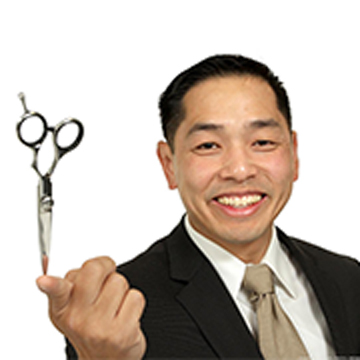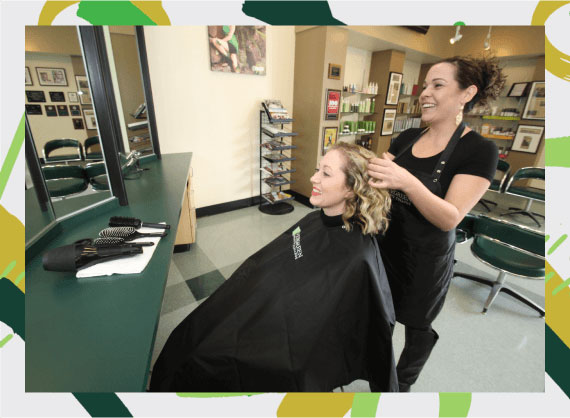An Overview of Esthetics and Cosmetology

Olesia- stock.adobe.com
Cosmetology encompasses an array of beauty treatments, including hair styling, nail services, and skincare treatments. Skincare, or the study of esthetics, is a branch of the beauty industry. As clean skincare became a widely popular momentum in the early 2000s due to increased consumer awareness, celebrities, influencers, and makeup artists took to social media to provide insider tips, appealing to anyone searching for refreshed and hydrated skin. Many skincare devotees will spare no expense on luxurious treatments or seek the help of a licensed esthetician—a beauty professional who specializes in skin treatments.
In this guide, we’ll review the fundamental differences between esthetics and cosmetology.
What is cosmetology?
Cosmetology comprises a wide range of practices taught in a comprehensive program, from hair coloring and makeup application to nail care and basic facial treatments. Though cosmetology is a broad study, many hair stylists graduate from the program and become certified and successful in their careers.
What is esthetics?
Esthetics is a specialized beauty industry field. Its practice and regimen are dedicated to healthy skin. It involves a trained approach to enhancing and maintaining the skin’s appearance and can be professionally practiced through makeup application and skin treatments. Esthetics goes beyond the basic facials learned in cosmetology school, such as hair removal and chemical peels.
Some estheticians work in medical settings, while many work in spas or salons, addressing various skin conditions and tailoring treatments to each individual’s skin type. When you study esthetics, you’re armed with an arsenal of tools that dive deeper into the skin’s anatomy, analysis, and treatments.
Esthetics training is comprehensive, equipping you with the skills to administer facial massages, comprehensive skincare routines, and a range of skincare services designed to rejuvenate and transform. Whether it’s a soothing facial massage or a more intensive chemical peel, estheticians have devoted countless hours to mastering these techniques, ensuring they can effectively help people improve their skin issues.

Natalie Faye stock.adobe.com
How to choose between studying cosmetology or esthetics
What separates esthetics from cosmetology is that esthetics is a specialization in the skin, while cosmetology covers a broader range of services within the beauty industry. Cosmetologists typically work in hair salons and sometimes spas, where they choose a career path as hair stylists or nail technicians.
Many beauty schools have adopted course specializations, offering programs with concentrations in esthetics, nail art and manicures, barbering, and cosmetology.
At Evergreen Beauty College, we offer programs that help students specialize in their desired beauty profession. If you want to dive deeper into the world of skin analysis and treatments, we encourage you to tour our school and learn more about our esthetics program.
For students with career goals of becoming makeup artists, a path in esthetics will deepen their knowledge of skin health, allowing for smoother makeup application customized to individual skin types and conditions.
The secret of success as a cosmetologist and esthetician
The key to a successful career as a cosmetologist or esthetician lies in having technical and customer service skills, being communicative, staying in touch with trends, and hustling to attract and retain new clients.
Attracting and keeping new clients is the most challenging part. At Evergreen, students will engage with real clients in social environments and have a chance to broaden their career opportunities by developing a client base at the campus salon.
According to PayScale, while beauty professionals offering esthetician services make slightly more than cosmetologists, cosmetologists can earn a decent living as salon managers or owners. According to ZipRecruiter, the salon manager’s average hourly salary in June 2024 is $19 hourly.
Here are some tips to help set you up for success in the beauty industry:
- Attend a certified beauty college
- Build a strong portfolio
- Obtain a cosmetology or esthetician license
- Continual education
- Invest in quality tools and products
- Network
- Utilize social media
- Create an inviting environment
- Always be professional
The benefits of becoming a cosmetologist and esthetician
Some benefits of working in the beauty industry, particularly as an esthetician or cosmetologist, include flexible scheduling, setting your hours, staying active on your feet most of the day, socializing with different guests, and being creative while on the clock.
Whether you want to explore your options or you have your sights set on a career as an esthetician or cosmetologist, reach out to one of our staff members to book a tour at any of our campuses today.
FAQ: What Separates Cosmetics and Esthetics
What can estheticians do that cosmetologists can’t?
The skills of estheticians and cosmetologists overlap. Estheticians typically have specialized training in skincare and are licensed to perform a broader range of skin treatments, while cosmetologists train in a broader range of beauty techniques.
Can I still do skincare with a cosmetology license?
Yes, you can still perform some skincare services with a cosmetology license; however, what you can do is limited compared to having an esthetics license. Cosmetology training includes basic skin care techniques, which allows licensed cosmetologists to provide basic facial treatments.
What is the difference between a makeup artist and an esthetician?
An esthetician provides skincare treatments such as facials, chemical peels, and hair removal, requiring specialized training and a state license. Many makeup artists study esthetics to deepen their understanding of skin care; however, they do not need a license to work as a makeup artist.




